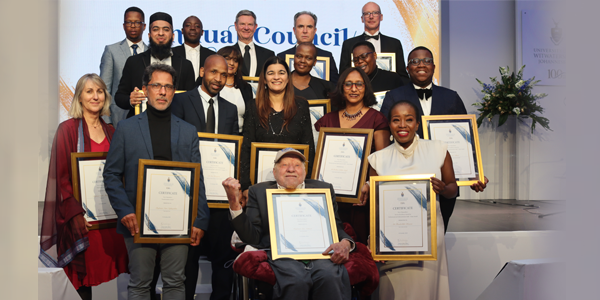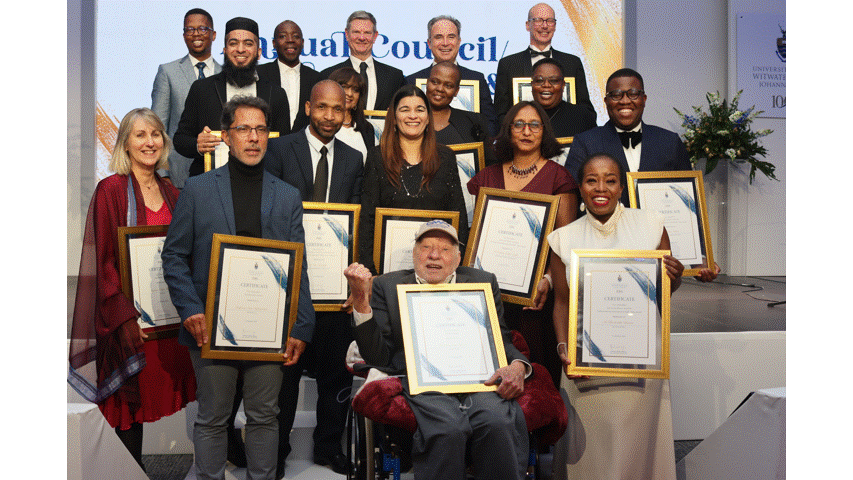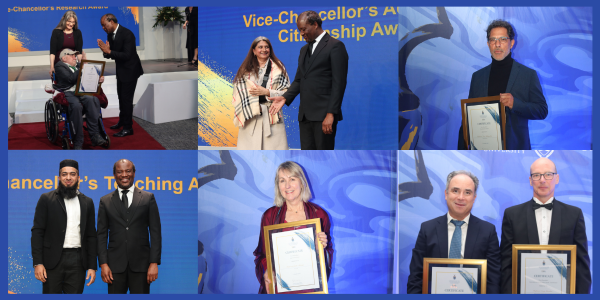Celebrating people and excellence
- Wits University
Duly deserved honours awarded to Wits staff at the annual Vice-Chancellor’s Awards.

The prestigious annual awards ceremony was held on 31 October to recognise excellence amongst academic and professional and administrative staff. The awards are a key feature of the Council/Senate Dinner, where the leadership and stewards of the University converge to mark the end of the year and celebrate staff achievements.
Wits Vice-Chancellor and Principal Professor Zeblon Vilakazi lauded Wits staff for their commitment to education and for responding to a higher calling.
“Many choose to work here because they have a mission bigger than them. This mission ‘critical assignment’ requires the best of us and is bigger than us,” said Vilakazi, acknowledging the role of staff in building a research-intensive university and developing the next generation of talent.
Taking inspiration from the Springboks, the 2023 World Rugby Cup champions, Vilakazi said the University is full of dreamers and should forge ahead, empowered by a shared vision, and continue to shape the future and give South Africa and Africa a place in the sun amongst great nations.

Excellence across categories
The awards kicked-off with the Vice Chancellor’s Awards for Service Excellence for Professional and Administrative 足球竞彩app排名, for which all grades of staff are eligible. These awards recognise exceptional customer/service focus, reliability/dependability and accountability, innovation and process improvement.
- Khwezi Ndawonde, an Academic Administrator in the School of Chemistry won in the Grade 10-13 category for her role in the smooth running of the School of more than 3000 students and 62 full-time staff members. Read more.
- Julia Mamabolo, an Administrator in the Philosophy Department and Sam Rangata, Deputy Head: Academic Information and Systems Unit (AISU), were named joint winners in the Grade 7-9 category. Mamabolo, who has worked in the Department for eight years, was praised for her organisational prowess – her commitment knows no bounds as she skilfully navigates complex processes. Rangata holds a critical role in the administrative machinery of the University. He has contributed significantly to the development of new approaches to systems aimed at improving productivity and saving time.
- Harshila Dulabh, Principal Data Scientist in Business Intelligence Services shone in the Grade 5-6 category. The University relies on high quality and well-curated data to function effectively. These data are essential building blocks for many strategic and operational decisions. In her role, Dulabh epitomises reliability and dependability when it comes to meeting the needs of the many stakeholders at the University.
- The Team Award was made to the remarkable and exceptionally talented team that successfully planned and executed several strategic events such as the Centenary Parade, the Free People’s Concert and the SRC Reunion that brought together multi-generational student leaders to mark Wits’ 100 anniversary in 2022. This includes teams from the Advancement Division (Communications; Functions and Events; Marketing; Alumni Relations; and Development and Fundraising), represented at the Awards by Shirona Patel, Reshma Lakha-Singh, Thembelihle Dlamini, and Peter Maher), and 足球竞彩app排名 Affairs, represented by Tshegofatso Mogaladi, Jabu Mashinini, Kabungo Mubanga, Tshepo Ndlovu, and Mongezi Maluleka (former SRC member).

Research, Supervision, Innovation, Citizenship, Transformation, Teaching Awards
Wits University is consistently ranked in the top 1% of global rankings and is internationally distinguished for research, high academic standards, and commitment to social justice. The University recognises outstanding achievements in these areas.
Research Award
Professor Lew Ashwal from the School of Geosciences was named the 2022 winner of the Vice-Chancellor’s Research Award, the highest accolade for achievement in research at Wits. The purpose of the award is to acknowledge the achievements of an exceptional Wits scholar who has demonstrated high levels of research excellence over a sustained period. In so doing, the scholar has contributed to the University’s strategic research objective of producing high quality research with impact.
Ashwal works on a planetary-scale and studies the origin, evolution and significance of igneous [solidified from lava or magma] rocks throughout Solar System history, focusing on Earth, Moon, Mars and asteroids. In 1993 he published a definitive treatise on anorthosites, i.e., intrusive igneous rocks characterized by their composition. Anorthosites constitute the bulk of the lunar crust, having formed during planetary accumulation of additional layers at the birth of the solar system. This work continues to place Wits University on a pedestal amongst intellectuals.
Academic Citizenship Award
This award recognises an individual’s cooperative involvement, as an academic, professional, and subject specialist, in the community of their faculty, the University, the wider national community, and the international community of scholars, in delivering a service, performing tasks, and making contributions to the functioning, wellbeing and upliftment of these communities. It includes those organisational citizenship activities conventionally classed as ‘administrative duties‘ as well as those related to community service or community participation. This award is open to both academics and professional staff.
The Academic Citizenship Award went to Professor Nirupa Padia, former head of the School of Accountancy who has flown the Wits flag by sharing her expertise on various University platforms, as well as in the profession by sitting as an academic representative on the Auditing Guidance Committee of the South African institute of Chartered Accountants (SAICA), and on the board of the PwC Business School. She also serves on the Independent Regulatory Board for Auditors.
Transformation Award
This award is aligned with the University’s five Transformation Pillars aims to recognise and encourage staff to take an active role in driving transformation at Wits. In terms of the South African Bill of Rights, transformation is the affirmation and promotion of the democratic values of human dignity, equality, and freedom.
Professor Noor Nieftagodien in the History Research Group has made significant contributions to the process of social transformation through his research, teaching and scholar-activism related to histories from communities, archival development, and fostering engagement between the institution and the multiple publics that it serves. His current works exemplify this, and they include the History of the Congress of South African 足球竞彩app排名s; Public Histories; Histories of Non-Racial Sport; and Histories of Soweto, amongst others.
Teaching Award
Professor Abdul Hamid Carrim, School of Computer Science and Applied Mathematics, has a vision to help students see the beauty of mathematics and overcome the ‘mathematical trauma’ to which many of them were inflicted throughout their schooling. His students concur; as he is also the recipient of the 2022 Distinguished Teacher’s Individual Award in the Faculty of Science . In addition to teaching first-year students pure maths, his classes include science, commerce and engineering students with varying levels of enthusiasm towards maths. This is when the magic of undoing maths trauma begins. Carrim embraces teaching large classes of students, as he can lay the foundation for coming years.
Supervision Award
As a research intensive institution, the University acknowledges that high-quality supervision is foundational to its goal of leading innovation and pioneering knowledge in the Global South. The University thus recognises such supervision at the highest level, through this award.
Professor Cathi Albertyn has a sustained record in postgraduate supervision and has been supervising at this level since the late 1990s, with numbers increasing as more students turn to postgraduate studies. She teaches postgraduate courses on constitutional law and human rights, and is engaged in research on equality, gender, human rights and constitutional law. A holder of the South African Research Chair in Equality, Law and Social Justice since 2018, this position has allowed her to expand her footprint in postgraduate supervision significantly.
Innovation and Social Impact Award
Collaborators Professors Andrew Thatcher from the Psychology Department in the School of Human and Community Development, and Craig Sheridan, the Claude Leon Foundation Chair in Water Research, from the School of Geography, Archaeology and Environmental Studies are joint winners of the 2022 Innovation and Social Impact Award.
This award was introduced in 2019 and is now amended to align with the University’s definition of innovation, which is “the successful deployment of new research ideas or methods to benefit society.” In this context an innovation is any positive social impact arising from research findings, and/or commercial impact arising from new knowledge.
This accolade is for the project called URBWAT, which involved co-designing and installing constructed wetlands into an urban informal settlement to deal with the collection and treatment of greywater disposal.
Sheridan led the engineering design and water quality analysis, while Thatcher lead the ergonomic design and social science work. Other team members included Professor Karin Tonderski and Dr Genevieve Metson from Linköping University in Sweden; Dr Uwe Kappelmeyer from the Helmholtz Centre for Environmental Research in Germany; Dr Chris Bode-Aluko, a postdoctoral fellow from Wits’ CiWARD; as well as a number of Masters’s and PhD students from School of Human and Community Development (Motshwaedi Sepeng, Boitumelo Malunga, and Hemal Jetha) and from the School of Geography, Archaeology and Environmental Studies (Ruth Stephenson, Michael Wilkie, and Taraz Rawhani).

